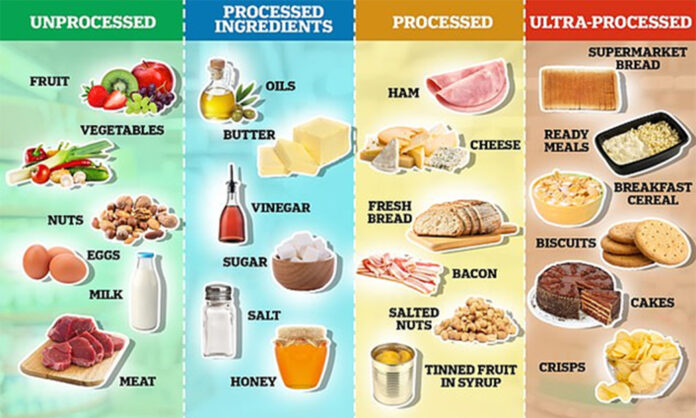Diets high in ultra-processed food may be harmful to every part of the body, a major review of research found. Ultra-processed foods — such as frozen dinners, sugary cereals, potato chips and fast food — account for up to 58 percent of total daily energy intake in the United States, the researchers said.
Ultra-processed food are linked to an increased risk of 32 health problems including cancer, type 2 diabetes and mental health disorders.
Often high in fat, salt and sugar and low in vitamins and fibre, researchers found ‘convincing’ evidence higher consumption was associated with a 50 per cent greater risk of dying from a heart attack or stroke.
In the biggest analysis of evidence to date involving 10million people, researchers found those eating the most had between a 40 and 66 per cent increased risk of dying from heart disease.
They were also significantly more likely to be diagnosed with obesity, lung conditions and sleep problems.
Likening it to tobacco, they said ‘public policies and actions are essential’ to curb intake and called on public health officials to urgently develop guidelines and ‘best practice’ for ultra processed foods.
In a linked editorial, they suggest foods are clearly labelled when ‘ultra-processed’.
UPFs refers to items which contain ingredients people would not usually add when they were cooking homemade food.
These additions might include chemicals, colourings, sweeteners and preservatives that extend shelf life.
Restrictions should be placed on advertising and sales ‘prohibited in or near schools and hospitals,’ they say.
Governments need to adopt national dietary guidelines recommending varieties of minimally processed foods, they say, while taking steps to make freshly prepared meals cheaper and more accessible to all.
The UK is the worst in Europe for eating ultra-processed foods, making up an estimated 57 per cent of the national diet.
They are thought to be a key driver of obesity, which costs the NHS around £6.5billion a year.
Often containing colours, emulsifiers, flavours, and other additives, they typically undergo multiple industrial processes which research has found degrades the physical structure of foods, making it rapid to absorb.
This in turn increases blood sugar, reduces satiety and damages the microbiome – the community of ‘friendly’ bacteria that live inside us and which we depend for good health.
Food additives like non-nutritive sweeteners, modified starches, gums and emulsifiers also seem to affect the microbiome, levels of gut inflammation and metabolic responses to food which may also increase risk of heart attack and stroke.
An umbrella review conducted by academics in Australia analysed 14 review articles published in the last three years which associated consumption with poor health outcomes.
Evidence was graded as convincing, highly suggestive, suggestive, weak or no evidence.
There was convincing evidence higher intake was linked to a 50 per cent greater risk of death from cardiovascular disease, a 12 per cent greater risk of type 2 diabetes, and a 48-53per cent greater risk of developing anxiety.
There was ‘highly suggestive’ evidence that eating more ultra-processed foods can increase chances of dying from any cause by a fifth, according to findings published in the BMJ.
This was also the case for when it came to obesity, type 2 diabetes, sleep problems and dying from heart disease, which all showed between a 40 to 66 per cent heightened risk.
Source: webmd.com









